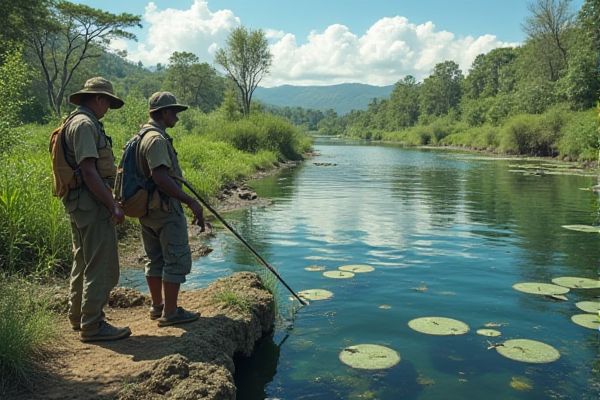
Zambia's aquaculture sector is experiencing significant growth, creating various job opportunities for individuals interested in fish farming, hatchery management, and aquaponics. Positions range from production managers and aquaculture technicians to researchers focusing on sustainable practices and environmental impact assessments. As the industry expands, there is a demand for skilled workers in areas such as fish health management, feed formulation, and marketing of aquaculture products. Engaging in training programs and workshops can enhance your skills and improve your prospects in this rapidly evolving field.
Job Description
Aquaculture jobs in Zambia involve various roles centered around fish farming, management, and sustainable practices in the growing aquaculture sector. Positions may include fish hatchery technicians, aquaculture farm managers, and water quality specialists, each contributing to the development of the industry through innovative methods and technologies. Your responsibilities could encompass monitoring fish health, optimizing feed strategies, and ensuring compliance with environmental regulations. The increasing demand for fish as a protein source in Zambia highlights the significance of these roles in supporting food security and economic growth within the country.
Requirement
Aquaculture jobs in Zambia require a combination of educational qualifications and practical experience in the field. Relevant educational backgrounds may include degrees in fisheries, aquatic science, or related disciplines, with hands-on experience in fish farming or aquatic resource management being highly advantageous. Knowledge of local fish species, environmental sustainability practices, and basic business management principles is often essential for success in this sector. Strong communication skills will also help in collaboration with stakeholders and the community, enhancing the overall impact of your aquaculture initiatives.
Salary and Perks Expected
Aquaculture jobs in Zambia offer competitive salaries that vary based on experience and specific roles within the industry. Entry-level positions may start around ZMK 3,000 to ZMK 5,000 per month, while more experienced professionals can earn upwards of ZMK 10,000 or more. In addition to salary, many positions include perks such as housing allowances, transportation benefits, and opportunities for professional development and training. Working in aquaculture also contributes to food security and sustainable development in Zambia, allowing you to make a positive impact in local communities.
Similar Job Names
- Aquaculture Farm Manager
- Fishery Scientist
- Hatchery Supervisor
- Aquaculture Technician
- Aquaculture Researcher
- Aquaculture Production Specialist
- Fish Health Inspector
- Aquaculture Extension Officer
- Fish Feed Production Manager
- Aquaculture Sales Representative
- Environmental Compliance Officer
- Aquatic Veterinarian
- Fisheries Biologist
- Aquaculture Quality Control Monitor
- Aquaculture Educator
Job Expectation Concept
Aquaculture jobs in Zambia are rooted in the country's rich natural resources, particularly its abundant water bodies. Professionals in this sector are expected to implement sustainable farming practices that ensure the health of aquatic ecosystems while meeting the increasing demand for fish and seafood. Skills in management, biology, and environmental science are highly valued, as is the ability to work collaboratively with local communities. Exploring aquaculture opportunities can lead to a rewarding career path that contributes to food security and economic growth in Zambia.
Career Advantage and Weakness
Aquaculture jobs in Zambia offer significant career advantages, including the growing demand for fish due to increased local consumption and export opportunities. This sector benefits from Zambia's abundant water resources, providing a favorable environment for sustainable fish farming practices. However, potential weaknesses include limited access to advanced technology and investment, which can hinder operational efficiency. Understanding both the advantages and challenges in aquaculture is essential for anyone considering a career in this promising field in Zambia.
Important Thing Must Know
Aquaculture jobs in Zambia offer a range of opportunities essential for the growth of the country's fish farming industry. With abundant water resources and a favorable climate, Zambia is well-suited for fish production, leading to increased demand for skilled workers in various fields, including management, operations, and research. Your potential role in this sector can significantly impact food security and economic development by providing sustainable protein sources for local communities. Training and educational programs are available, focusing on modern aquaculture techniques and best practices, ensuring that you stay competitive in the job market. Networking with local organizations and associations can further enhance your career prospects and contribute to the industry's advancement in Zambia.
Alternative Career Options
Aquaculture jobs in Zambia present a range of alternative career options that extend beyond traditional fish farming. Opportunities include roles in aquaculture technology development, which focus on improving farming practices and sustainability. You can also explore positions in environmental consultancy, helping to assess and manage the ecological impact of aquaculture projects. Additionally, the growth of local and export markets creates demand for careers in marketing, logistics, and distribution within the aquaculture sector.
Companies List
- Lake Harvest Aquaculture
- Zambezi Fish Farms
- Kafue Aquaculture
- African Rivers Farms
- SunFish Zambia
- Tiger Fish Zambia
- ZamFish Limited
- Zambia Aquaculture Enterprises
- Choma Aquaculture
- Mulungushi Fisheries
List of Ideal City
Lusaka, the capital city of Zambia, boasts a growing aquaculture industry with numerous job opportunities in fish farming and management. Livingstone, known for its proximity to the Zambezi River, offers roles in sustainable aquaculture practices, leveraging its rich aquatic resources. Kitwe, a hub in the Copperbelt province, is expanding its agricultural sector, including aquaculture, providing diverse employment options. Ndola also presents chances in fish farming initiatives, allowing you to explore a unique career in Zambia's thriving waterways.
 zambia-jobs.com
zambia-jobs.com